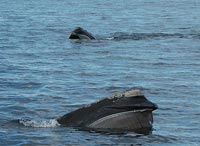 Recently almost one hundred endangered right whales were observed feeding in the waters of Block Island Sound. Given that only between 350 and 400 of the North Atlantic Right Whales are believed to currently exist, the gathering was quite unusual.
Recently almost one hundred endangered right whales were observed feeding in the waters of Block Island Sound. Given that only between 350 and 400 of the North Atlantic Right Whales are believed to currently exist, the gathering was quite unusual.
Scores of right whales ‘cavorting’ in Block Island Sound
“It’s like a third of the world’s population is cavorting out there,” said Grover Fugate, executive director of the state’s Coastal Resources Management Council, which is directing a massive study of the coastal waters to prepare for development of an offshore wind-turbine complex.
Fugate said he received reports from scientists doing bird studies in the area and from the National Oceanic and Atmospheric Administration, which monitors right whales as they migrate between wintering areas off Florida and the summer feeding grounds off northern New England and Canada.
Fugate said many other whale species were also spotted, including minkes and finbacks.
Have you ever had a day where you felt “lower than whale crap?” If so, perhaps the object of the metaphor deserves elevating. Australian scientists are now saying that say that whale feces may play a role in fighting climate change.
Climate Change: Whale Poop To The Rescue!
Experts from the Australian Antarctic Division discovered that whale feces effectively place a plant-friendly fertilizer into ocean water.
“When whales consume the iron-rich krill, they excrete most of the iron back into the water, therefore fertilizing the ocean and starting the whole food cycle again,” scientist Steve Nicol told the AFP.
The researchers said that if whale numbers grow, their feces could help marine plant life flourish, which inevitably improves the ocean’s ability to absorb carbon dioxide, which is to blame for global warming.
